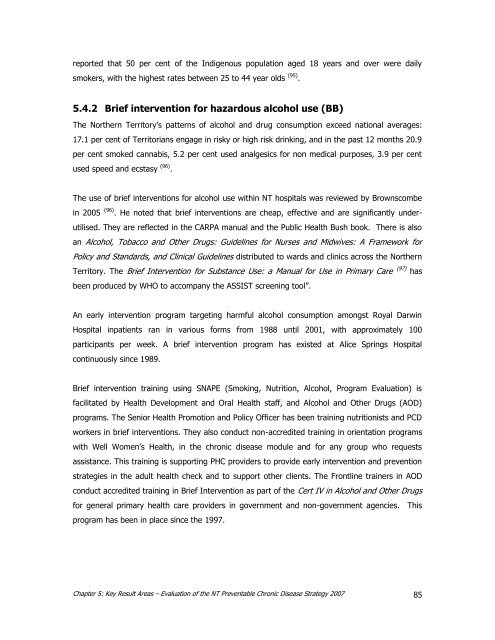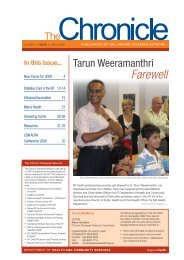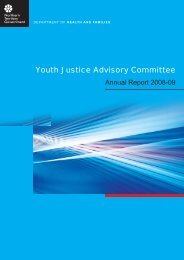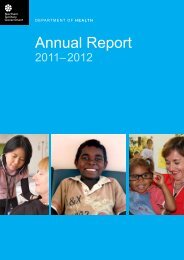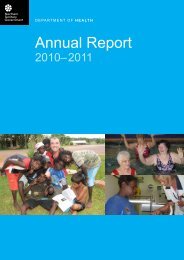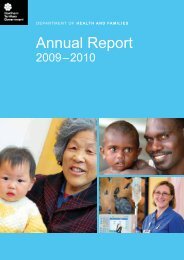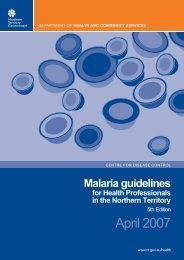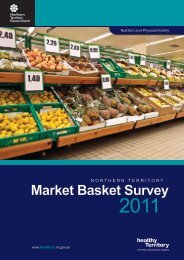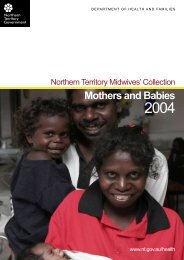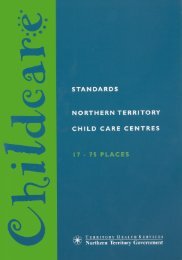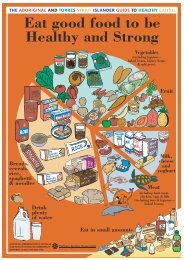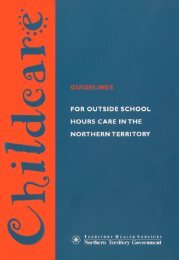PCD Strategy Evaluation 2007.pdf - NT Health Digital Library ...
PCD Strategy Evaluation 2007.pdf - NT Health Digital Library ...
PCD Strategy Evaluation 2007.pdf - NT Health Digital Library ...
Create successful ePaper yourself
Turn your PDF publications into a flip-book with our unique Google optimized e-Paper software.
eported that 50 per cent of the Indigenous population aged 18 years and over were dailysmokers, with the highest rates between 25 to 44 year olds (95) .5.4.2 Brief intervention for hazardous alcohol use (BB)The Northern Territory‟s patterns of alcohol and drug consumption exceed national averages:17.1 per cent of Territorians engage in risky or high risk drinking, and in the past 12 months 20.9per cent smoked cannabis, 5.2 per cent used analgesics for non medical purposes, 3.9 per centused speed and ecstasy (96) .The use of brief interventions for alcohol use within <strong>NT</strong> hospitals was reviewed by Brownscombein 2005 (96) . He noted that brief interventions are cheap, effective and are significantly underutilised.They are reflected in the CARPA manual and the Public <strong>Health</strong> Bush book. There is alsoan Alcohol, Tobacco and Other Drugs: Guidelines for Nurses and Midwives: A Framework forPolicy and Standards, and Clinical Guidelines distributed to wards and clinics across the NorthernTerritory. The Brief Intervention for Substance Use: a Manual for Use in Primary Care (97) hasbeen produced by WHO to accompany the ASSIST screening tool”.An early intervention program targeting harmful alcohol consumption amongst Royal DarwinHospital inpatients ran in various forms from 1988 until 2001, with approximately 100participants per week. A brief intervention program has existed at Alice Springs Hospitalcontinuously since 1989.Brief intervention training using SNAPE (Smoking, Nutrition, Alcohol, Program <strong>Evaluation</strong>) isfacilitated by <strong>Health</strong> Development and Oral <strong>Health</strong> staff, and Alcohol and Other Drugs (AOD)programs. The Senior <strong>Health</strong> Promotion and Policy Officer has been training nutritionists and <strong>PCD</strong>workers in brief interventions. They also conduct non-accredited training in orientation programswith Well Women‟s <strong>Health</strong>, in the chronic disease module and for any group who requestsassistance. This training is supporting PHC providers to provide early intervention and preventionstrategies in the adult health check and to support other clients. The Frontline trainers in AODconduct accredited training in Brief Intervention as part of the Cert IV in Alcohol and Other Drugsfor general primary health care providers in government and non-government agencies. Thisprogram has been in place since the 1997.Chapter 5: Key Result Areas – <strong>Evaluation</strong> of the <strong>NT</strong> Preventable Chronic Disease <strong>Strategy</strong> 2007 85


